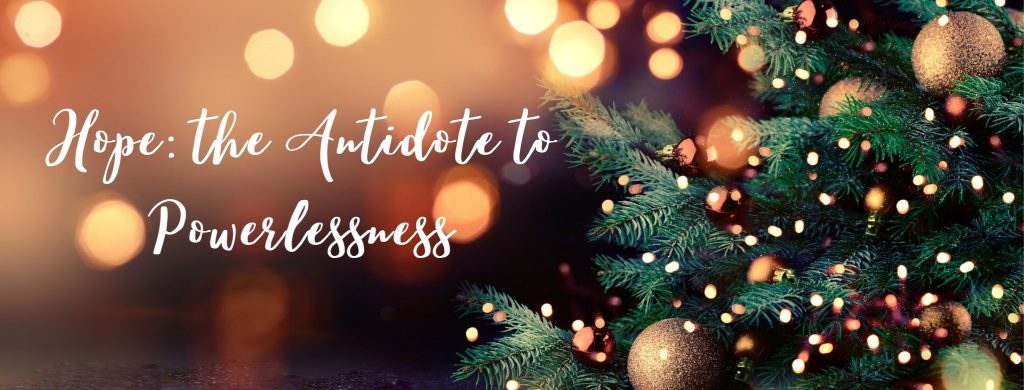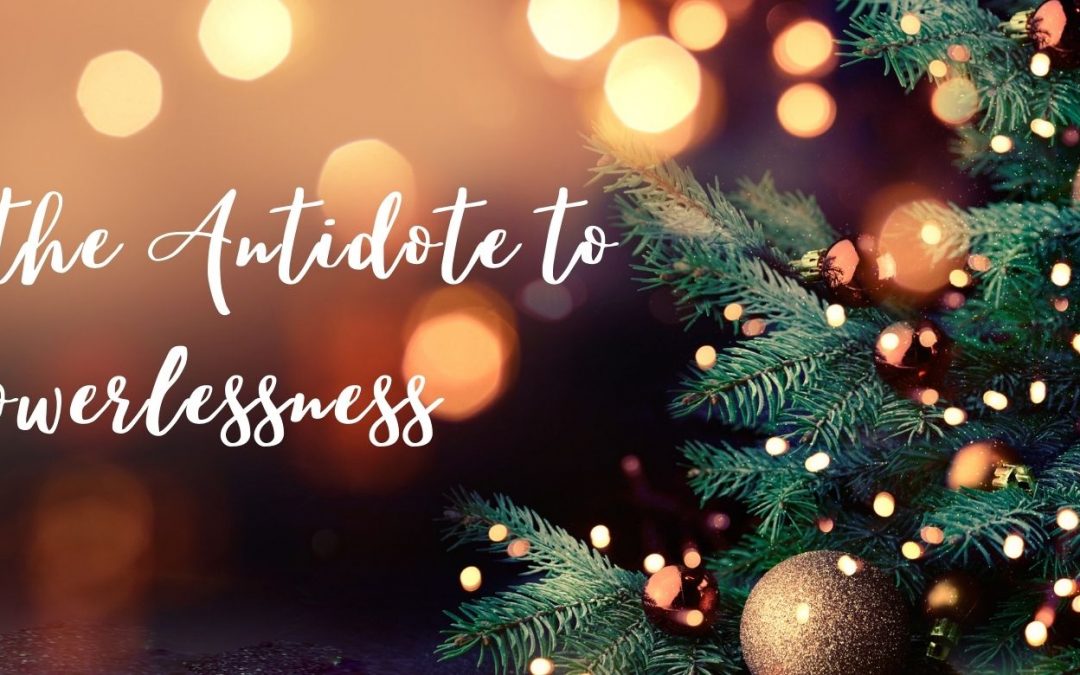
How would you summarize 2020 in one word?
Pandemic?
Chaos?
Disappointment?
Zoom?
All of the above are apt descriptors for this merciless year but at least for me, they don’t quite capture it as succinctly as this one: powerlessness. I’ve felt incredibly powerless in the past nine months and to be totally honest, it’s not my favorite feeling.
I feel powerless to stop the virus. Powerless to protect my aging mom. Powerless to convince the politicians that we the peopleare the reason they’re D.C. Powerless about the success or failure of my new book. And on and on it goes.
Of course, despite my feelings, I am rarely completelypowerless. Feelingpowerless and beingpowerless are two different things. I might not be an epidemiologist creating a vaccine but I can wear a mask, limit contact with non-family members, and follow other CDC guidelines. I can’t make the governmental leaders act sanely but I can vote and speak up when I see injustice. I can’t make anyone buy my book but I can faithfully and diligently get the word out.
Typically, we have agency over how we respond.
I’ll give you an example from a season when it seemed like my life was totally unraveling. Twenty years ago this fall, I got sick. It wasn’t just a little head cold or even a more serious flu or pneumonia. After six weeks on antibiotics, a numbing fatigue set in. Not long after, the pain started. Everything hurt. And I mean everything.
During the next two years, bruises lined my arms from the constant blood draws. I had CT scans, X-rays, and barium swallows. I endured humiliating questions from far too many specialists. One rheumatologist suggested that I was depressed and handed me a prescription for an anti-depressant. Before he walked out of the room. I told him if I was depressed, it was because I was in so much pain and no one, including him, was taking me seriously. It took two years to figure out that I had a gluten allergy (otherwise known as celiacs) which triggered several auto-immune diseases such as chronic fatigue and fibromyalgia.
I felt a whole lot of powerlessness in that season.
But, I did have options. I could have submitted to the illness and given up. (Not really a valid choice with three young children in the house.) I could have gotten stuck in a loop of venting, blaming, and complaining. Instead, I chose to keep asking for help, keep praying, and keep pursuing other options. (Thankfully, a naturopath helped me to figure out what was going on and I am forever grateful.)
Hope plays a major role in seasons of powerlessness. This is tricky because powerlessness can breed hopelessness.
What we put our hope in matters. In fact, that choice sometimes determines the strength and longevity of our hope. Those of us who follow Jesus are admonished to “put our hope in God.” In some seasons, it’s easier to sing about putting our hope in God than to actually put our hope in God.
Part of the challenge is that it may not be obvious what putting our hope in God actually means. We know we can’t control God and therefore should not expect him to serve us like a cosmic Santa. So what exactly are we hoping in?
First, it’s worth noting that though hope and faith are synergistic, they’re not the same. Faith refers to having a belief in someone or something. Hope is more of a mindset. A looking forward with eager anticipation. Where faith grounds us, hope buoys us. Having faith that God will never leave us and will never stop loving us should give us hope. Hope helps us believe that life will include something good or redemptive or beautiful. Hope helps us get out of bed in the morning.
Over the past nine months, I’ve spent more than a few hours pondering whether or not hope is a choice. Is it within our reach to choose hope* or is it predetermined by our genetics or our personality type? If the former, how can we choose hope when the morning news portends doom and disaster?
To some extent, it’s organic for each one of us. Since the time I was a child, beauty stokes my hope, which is why I love being in nature. Things that are dependable—things that I can put my faith in—give me hope. Like the Holy Spirit’s presence and the sun coming up over the eastern seaboard each morning.
We are now in the middle of Advent which is a season marked by waiting and hoping. Darkness and light. Perhaps it’s helpful for us to remember that sometimes, choosing hope simply means turning toward the Light and letting hope triumph over powerlessness.
I wish you all a healthy, peaceful, and joy-filled December.
*For those who struggle with depression or other mental illnesses, simply choosing hope can be much more complicated or at times, impossible. Please know that on those days or in those seasons when you lack hope, it’s not your fault.
To subscribe to my newsletter, go to my home page and simply fill out the form. I’m always giving away books and including links to great stories and images.
